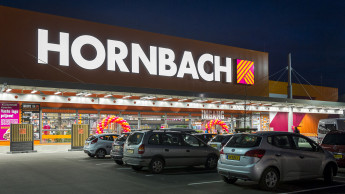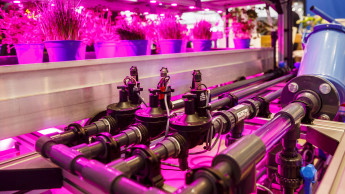DIY groups have opened their first branches, making good use of the time during which the Chinese market has been opening up step by step to western investors and the Chinese government has been making efforts to introduce a market economy
Since new-build flats in China are as a general rule sold in the form of "concrete boxes", which means they are more or less building shells that the purchaser is left to finish himself, there exists a demand here which is directly linked to the volume of construction. According to official figures, last year saw the completion of flats covering a total area of 501 mio m². Rough estimates give a total of at least 41.5 bn euro for the initial furnishing of these raw shells. In the next five years it is intended to create a further 5.7 bn m² of living space, with 2.7 bn m² in urban and 3 bn m² in rural areas.
Flats in conurbations are generally between 50 m² and 170 m² in size and include a living room, from one to three bedrooms, a kitchen and one or two bathrooms.
DIY still not widespread
Doing-it-yourself is so far not very widespread in China. The slogan here is rather "buy-it-yourself", which means select the products yourself and have the assembly and installation work done by contractors.
The proportion of DIYers in the population is below 25 per cent. The Chinese carry out only quite simple jobs themselves, such as changing light bulbs, hanging up pictures and gardening though only one per cent of the city dwellers actually have a garden.
Contractors are required for laying flooring and tiles, installing kitchens, bathrooms, painting jobs and electrical wiring, etc. The definition of such a contractor, though, bears no com-
parison with European standards for craftsmen, for contractors in China are mainly agricultural workers without any specific training. Their services can be enlisted at correspondingly bargain rates. The hourly pay of a skilled worker is twenty-one times that of a manual worker.
DIY stores take the field by storm
Categories of products relevant to DIY stores are still today in China sold through traditional "garage shops" and the specialised trade. These garage shops account for almost 50 per cent of sales. Shanghai's Hardware Street provides a good example. Part of Beijing Road, not far from the centre of the city, and quite a few side streets are today still characterised by many small hardware shops which sell everything, from nails and screws to iron pipes and even power tools. Their customers are mainly contractors. Even buyers from the big DIY groups go there every few weeks to gather information.
DIY stores of a European calibre, that is large-format businesses with different classes of goods under the one roof, are still a very recent development in the Middle Kingdom. The main representatives of this type are B&Q, OBI, Homemart, Jinbai, Homeway and Orient Home.
The DIY stores of the Chinese companies constitute serious competition for OBI and B&Q. As a rule they have a floorspace of between 8000 m² and 10 000 m². The product mix is not so comprehensive, but definitely comparable, at least with B&Q. They are clearly recognisable copies of western DIY superstores that have been adapted to the country's traditio- nal trading structures, which results in simpler fittings, less display area and advisory services.
Homemart has five stores, mainly in the Shanghai conurbation. They boast floorspaces of 8 000 m² to 10 000 m² and are generously designed. In the product mix the emphasis is on "soft" DIY products such as those required for interior decoration, especially paint, wallpaper and pictures.
Jinbai operates three stores in Shanghai. One of them is no more than a few hundred metres away from B&Q's headquarters and store. It offers a similar product mix to Homemart's, on an area of around 10 000 m² spread over two floors, but the set-up is rather plainer and the display area is smaller. The offer includes sanitary products, tiles and kitchen equipment in particular.
Homeway operates three stores at Tianjing (two) and Xi'an. The stores are designed in the style of Home Depot, for during the initial developmental phase the Ame- ricans were a party to the enterprise.
Orient Home has a four or five store presence in the north, especially in the Peking area, where the company has its headquarters.
DIY in Europe 5/2001












